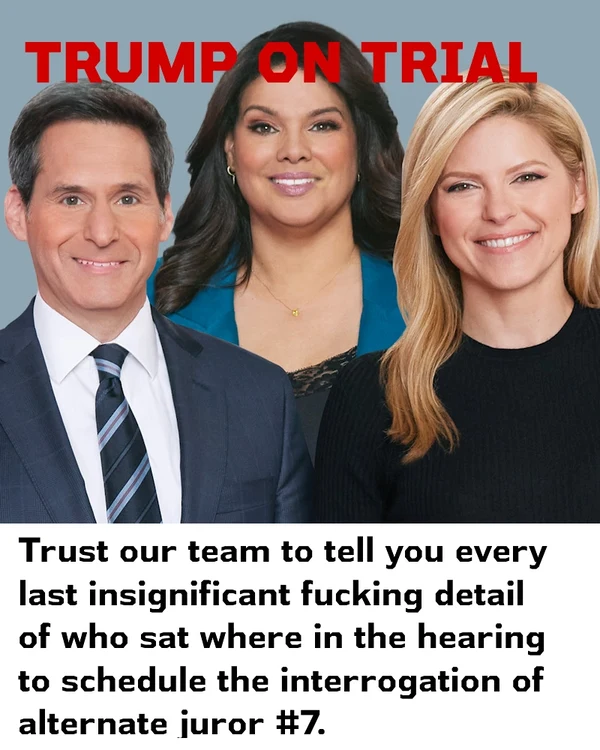If a judge tried to tell a general how to conduct a military operation, that would be illegal.
— JD Vance (@JDVance) February 9, 2025
If a judge tried to command the attorney general in how to use her discretion as a prosecutor, that's also illegal.
Judges aren't allowed to control the executive's legitimate power.
Burgers have an extremely r-slurred political system. If a PM in Canada actually tried the Burger "Ignore the courts", the House of Commons would force a non confidence vote, and they would likely lose it.
What's the point of the judiciary if one of the President's goons says "The President said so"?
MAGA cultists should be forced to pay a 300% tariff on everything.








Jump in the discussion.
No email address required.
There are almost 700 US District Judges. The fact that at least one of them is a glaring r-slur, as pointed by the Harvard professor, and willing to throw out his credibility to annoy Trump isn't surprising. Said r-slur is also not singlehandedly "the constitutional auditors"™ or the final word on the subject.
Jump in the discussion.
No email address required.
Not the final word, but they are a check, it's part of the process.
Still stuck on that huh
Jump in the discussion.
No email address required.
Yea, I'll stick to it because the leading constitutional scholars at Ivy League schools aren't really known for being Trump loyalists. I think Alan Dershowitz is the only one to speak of and this isn't him. Chances are that this judge will be overturned and it's also only a temporary halt for like a week anyways.
Jump in the discussion.
No email address required.
If you reckon one in 700 federal judges could be wrong, what's one in 115 law professors?
Jump in the discussion.
No email address required.
The number is more relevant in the context of understanding that this isn't the collective voice of the constitutional auditors restraining Trump. In terms of an Ivy League professor of constitutional law being wrong on it, of course it could happen too. What's suggestive, though, is one of them, not known at all for being a Trump supporter, is willing to put his own reputation on the line to say, in no uncertain terms, that the judge is violating the separation of powers. You can see why an Obama appointee would thwart, or at least slow down, Trump, but what's the perverse incentive for professor Vermeule here?
Jump in the discussion.
No email address required.
Um, being a catholic integralist like vance? https://en.wikipedia.org/wiki/Adrian_Vermeule
Jump in the discussion.
No email address required.
That doesn't really answer the question. One doesn't get to be a Harvard constitutional law scholar by holding a personal belief about the ideal Catholic society that they can't differentiate from the actual legal system. And Catholic integralism itself has nothing to do with the question of the executive branch exercising its power over the treasury department as far as I can tell. I guess you could say that this guy might be predisposed to like the vice-president on a personal level, but I just don't see how that translates into him throwing away his reputation in order to be blatantly wrong about the separation of powers here.
Jump in the discussion.
No email address required.
You're insinuating that this person represents the dispassionate, sober consensus opinion at Harvard. He doesn't. His 'incentive' is that he has heterodox opinions on the legal system - which are probably informed by his catholicism. If you're going to appeal to authority when you keep insisting 'b-b-but, he went to the HECKIN' IVY LEAGUE!' you need to accurately summarize the authority's position (the Ivy League's) and not conflate it with its lone tradcath alumnus.
Jump in the discussion.
No email address required.
I'm insinuating that if your average r-slur can differentiate between what they want the law to be (e.g. full drug decriminalization) versus what it is (heroin is illegal), then a Harvard law professor can do it too. He's addressing a question here of American constitutional law, something he's a scholar in, not Catholic integralism. I also don't see anything about a personal preference for Catholic integralism that would somehow make him so overwhelmingly biased on this straightforward question of the executive's power over the treasury that he would end up conflating the two, very different, spheres.
Jump in the discussion.
No email address required.
More options
Context
More options
Context
More options
Context
More options
Context
I can absolutely see a (really dumb to follow up on) perverse incentive for the judge and likewise see only reasons NOT to speak out for the professor, if the professor was acting cynically. I think that's pretty good evidence that the professor is speaking sincerely, and that both of these are compelling circumstantial evidence for the theory that the judge is acting beyond their powers for politically motivated reasons.
I just also believe there's possibly a reason the President usually doesn't mess with the Treasury so directly. Ain't that a Congress thing?
So I think your belief is reasonable, but I'm not so convinced of it.
Jump in the discussion.
No email address required.
I think that Trump's approach is unprecedented, but I really don't know that much political history from before my lifetime that isn't like the large or major events. But I think it's still well within the scope of the executive power. Otherwise, nothing really to add. I think your comment is a good summation of things. We'll leave it at that.
Jump in the discussion.
No email address required.
More options
Context
Treasury is very much part of the executive branch. Still serves at the pleasure of the president.
Gavel to gavel coverage, powered by cable.
Jump in the discussion.
No email address required.
More options
Context
More options
Context
More options
Context
More options
Context
More options
Context
More options
Context
More options
Context